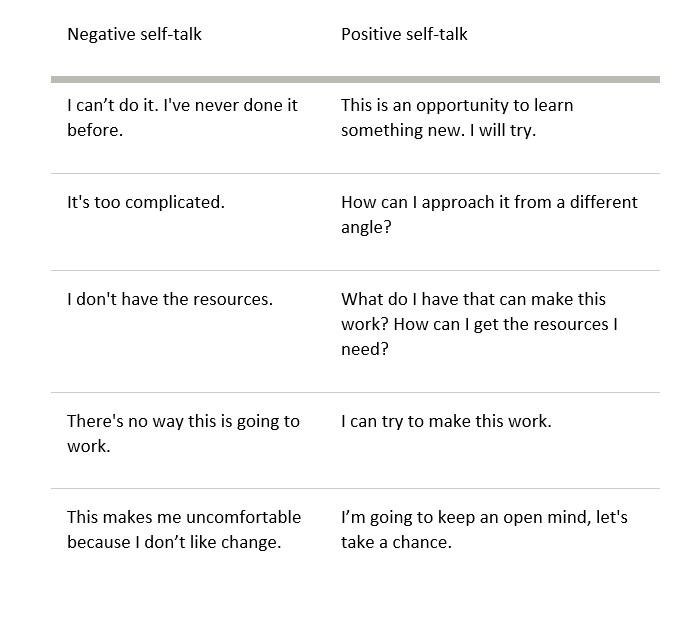Having a positive mindset correlates with better psychological and physical well-being and can even increase your lifespan. A positive, optimistic person tends to view their life as exciting and full of possibilities. When it comes to the workplace, your attitude plays a vital role not just in how others perceive you, but your job satisfaction and performance.
Maintaining a positive mindset in the workplace, day in and day out, can be difficult. Work can be stressful and challenging, and most professionals face obstacles and deadlines regularly. To keep a positive mindset, you have to work at it. In this article, we explore the benefits of a positive mindset and how you can improve your positive thinking skills.
What is a positive mindset?
Having a positive mindset doesn’t mean you’re walking around with a smile on your face and your head in the clouds, ignoring life’s less pleasant situations. A positive mindset just means that you approach challenging situations in a more positively and productively. You believe the best is going to happen and don’t expect the worst.
Your mindset is heavily influenced by your self-talk – the endless stream of unspoken thoughts that run through your head. These thoughts are generated automatically and can be positive or negative. Some of your internal monologues stem from logic and reason. Other self-talk may emerge from misconceptions, misguided expectations, or fear.
If the thoughts that run through your mind are mostly negative, you are more likely to have a pessimistic outlook on life. If your self-talk is mostly positive, you’re more likely to be an optimist — someone who has a positive mindset.
The benefits of having a positive mindset
Studies show that characteristics such as optimism and pessimism can affect many areas of health and well-being. Positive thinking is a key part of effective stress management. Having a positive mindset enables you to cope better in nerve-wracking situations, which reduces the harmful effects that stress can have on your mind and body.
Health benefits of positive thinking
Effective stress management is associated with many health benefits, and medical researchers are continuously exploring the effects of a positive mindset and optimistic outlook on our health.
The health benefits that positive thinking may provide include:
· Increased life span
· Lower rates of depression
· Lower levels of distress and pain
· Greater resistance to illnesses
· Improved mental and physical well-being
· Improved cardiovascular health
· Reduced risk of death from cancer, respiratory conditions, and infection
· Better coping skills during hardships and times of stress
How a positive mindset in the workplace can improve productivity
Developing a positive mindset in the workplace won’t necessarily make you better at your job, but it will improve the way people perceive you as a person. When someone feels positive in your presence they are more likely to support you and help you to succeed.
Jessica Pryce-Jones, the author of Happiness at Work and founder and director of Webpsyched conducted research with over 3,000 respondents in 79 countries on the impact of happiness on productivity. The participants who claimed to be happy were 180 percent more energized at work, 108 percent more engaged, 50 percent more motivated, and 50 percent more productive.
This data suggests that positive thinking indirectly affects your productivity by improving factors such as mindset, motivation, focus, and energy.
How to maintain a positive mindset in the workplace
If you are reading this and starting to worry because you know you’re a born pessimist, don’t despair — you can learn positive thinking skills. Below you will find some simple yet helpful ways to maintain a positive mindset in the workplace, whether it comes naturally to you or not:
Surround yourself with positive people
When you interact with people every day their perspectives and opinions can eventually influence your mindset. If you work with negative people who are criticizing and grumbling all the time, you typically find yourself – consciously or not – taking on aspects of their perspectives. To avoid this, you should try to surround yourself with positive people.
Of course, it’s unlikely you will be able to choose your co-workers – but you can try to be mindful of how much time you spend around them. If you’re stuck with a negative group, be careful not to participate in the negativity. Take regular breaks and go outside to get some space rather than immerse yourself in negative water-cooler gossip and drama.
Find like-minded co-workers who enjoy their job and contribute to the company culture. People who have hobbies they are passionate about outside of work also tend to be more positive.
Find positive content that suits you
If you find it challenging to maintain a positive mindset while you’re at work, you can explore ways to improve your outlook. You could try listening to your favorite music or an audiobook you’ve been looking forward to, or research podcasts that focus on positivity, or a subject you want to learn more about. Outside of work hours you could read motivational books and articles or watch inspirational online videos such as TED talks that suit your preferences and personal goals.
It can also be beneficial to turn off the news feeds and notifications on your phone or computer – they usually contain tragic and negative events. Keeping your thoughts focused on enjoyable, positive, and relatable content can significantly affect your mood.
Consider your language
The language we use on a daily basis has a cumulative effect on how we think about ourselves, our work, and the people around us.
Consider how you think and speak in the workplace. Is your language affecting how you feel? This may sound like a difficult question, but it can be as simple as acknowledging how you describe your workday to your colleagues in the morning. If your schedule is filled with laborious tasks, boring meetings, and anxiety-inducing client calls, you might be bringing yourself down before you’ve started your day.
It may seem asinine, but it can make a difference if you try to find a more positive way to view your work. Rather than seeing your day as packed with gruelling tasks, it could be filled with opportunities to learn. ‘Tasks’ sound tiring and arduous, but ‘opportunities’ are exciting and brimming with potential. Small changes in how you speak can have a big impact on how you feel.
Practice positive self-talk
If you are going to change your language you should start with your self-talk. Be gentle and encouraging with yourself. Begin by following one simple rule: Don’t say anything to yourself that you wouldn’t say to another person. If a negative thought pops into your mind, take a moment to evaluate it rationally and respond with a positive affirmation.
Here are some examples of negative self-talk and how you can apply a positive mindset to them:

Set daily and weekly high points
It can be difficult to maintain a positive mindset in the workplace if your days feel dreary and monotonous. Having something to look forward to can make otherwise bleak days more bearable. Setting yourself ‘high points/ can give you an incentive to push through on a project or get through a tough day.
These high points could include small daily things, such as taking a walk at a specific time with a favorite co-worker, or larger weekly rewards, such as buying a new book or visiting a spa.
Keep your daily high points small and simple. You don’t want an expensive daily habit or one that could harm your health. Weekly or monthly high points can be larger. Maybe every Wednesday you eat lunch at a local restaurant instead of bringing your own food. Whatever your high points are, make sure you’re excited about them.
Address known problems ahead of time
Unfortunately, we all have to face things at work that we dread. Maybe you have a nightmare client, a tedious morning meeting, or a co-worker that intimidates you. You know these things upset you. For example, you know your client is going to demand another round of unnecessary edits, you’re expecting it, and you can choose to be calm about it. Accept the circumstances and decide ahead of time that your only goal is to maintain focus and to truly attempt to resolve any issues.
If you can address your reaction ahead of time, you’ll be able to continue in a calm and more positive manner.
Stop complaining
No one likes to spend time with a consistent complainer – that person who focuses on the negative in any and every situation. Complaining rarely accomplishes anything, it impacts morale and can reduce productivity. In the workplace, it can be hard to avoid your co-workers, but it can be beneficial to limit your time with negative people.
It is also important to understand that you might be the complaining culprit! If you evaluate your language and realize you tend to complain a lot, try to identify when it occurs most often, and stop yourself from blurting out something negative. Instead, try to find the source of your discontent and figure out what you can do to address it. Often, simply adjusting your perspective around an issue and accepting that you cannot influence the situation will help.
Accept that no one owes you anything
Time for some tough love. You will struggle to maintain a positive mindset if you go through life believing people owe you. No one owes you anything. Thinking otherwise means living in a constant state of victimhood, blame, passive-aggressiveness, anger, and hopelessness.
How can you improve a negative attitude of entitlement?
· Understand it’s your responsibility to make things happen
· Realize that working hard produces good results
· Be open-minded and willing to accept change
· Believe that when times are difficult, you can keep going
· Accept help from others and offer support without expecting reciprocation
If you can try to focus on the above concepts, you can avoid stagnating in a state of negativity waiting for the world to provide opportunities for you.
Set yourself goals
One of the most common ways to develop a positive focus at work is to establish a set of personal goals. Goals will help your time and project management and highlight progress and
A happy, engaged employee understands their contribution to the company they work for and has the opportunity for career development. That’s because it can be tough to be positive if you think you’re going nowhere. Goals are proof that you have a plan and you’re working towards something. You can tailor your goals to suit you, but it can help to discuss these targets with your manager for support.
Take a deep breath
If you find yourself in a stressful situation in the workplace, take a moment, and take a deep breath. Breathing deeply helps your body to calm down. If possible, find a quiet place where you can be alone, and do some deep breathing exercises. These exercises reduce stress and allow you to clear your mind and potentially see the situation in a different, more positive way.
How to maintain a positive mindset in the workplace – a conclusion
It isn’t easy to maintain a positive mindset in the workplace daily. We all have to deal with unexpected and challenging situations that can break us down and let our negative biases take over. But, when your state of mind is generally optimistic, you are better equipped to handle everyday stress more constructively and productively.
